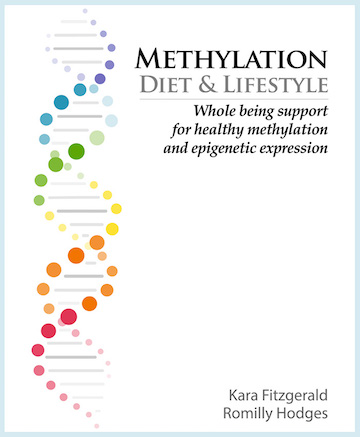Methylation - What's all the fuss?
By Dr. Kara Fitzgerald and Romilly Hodges MS CNS Send this article to a friend
Send this article to a friendAs many of you know, Dr. Margaret is deeply interested in health and nutrition, so she is pleased to publish this excellent article by her friend, Dr. Kara Fitzgerald.
 If you or anyone you know has a history of heart disease, depression, Alzheimer’s disease, ADHD, diabetes, insomnia or autism, these are just some of the conditions that have been linked to faulty methylation. If you are pregnant, or thinking of becoming pregnant, then supporting methylation to prevent neural tube defects (and actually lots more!) is super-important too. It’s the reason your doctor tells you to make sure you’re getting enough folate (or folic acid).
If you or anyone you know has a history of heart disease, depression, Alzheimer’s disease, ADHD, diabetes, insomnia or autism, these are just some of the conditions that have been linked to faulty methylation. If you are pregnant, or thinking of becoming pregnant, then supporting methylation to prevent neural tube defects (and actually lots more!) is super-important too. It’s the reason your doctor tells you to make sure you’re getting enough folate (or folic acid).
Methylation is a process that happens in every cell of our body. Here are some of the ways we use methylation:
- Cell division and renewal
- Healthy immune cells
- Synthesizing and clearing adrenaline
- Detoxification in the liver (and elsewhere)
- Producing energy for cells to use in chemical reactions
- Clearing out excess estrogens and histamine
- Regulating how our genes get expressed
Don’t miss that last one! Methylation is one of the ways that the body makes sure the right genes are turned on, and the ones that we don’t want get turned off. This has really far reaching implications for just about everything that happens in the body. It also means that even if we have a gene that predisposes us to a disease like Alzheimer’s, we can help that gene to stay silent by supporting healthy methylation.
MTHFR
You may have heard about the MTHFR gene. MTHFR stands for methylenetetrahydrofolate reductase, an enzyme that converts folate into the active form (5-mTHF) that can be used to make S-adenosylmethionine (SAMe). SAMe is a fantastically versatile compound and used in most methylation reactions. A well-functioning MTHFR gene also helps to keep homocysteine within normal levels. Homocysteine is a compound that may have come onto your radar if you have heart disease since higher levels have been associated with worse outcomes if you have this condition.
If you already know what MTHFR is, perhaps you know that you have a variant of this gene such as C677T or A1298C. If you have two copies of the C677T gene (this means you are homozygous for this variant) then the MTHFR enzyme’s activity can drop by 70-75%. If you have one copy of this gene (heterozygote) then activity can be reduced by 33-35%. If you have two copies of the A1298C variant you may lose 39% of MTHFR activity.
 Treating Methylation Deficits
Treating Methylation Deficits
Most often, treating methylation deficits involves adding supplemental nutrients such as natural folates (5mTHF), B12 and betaine to help overcome the lagging enzyme activity. We know that this approach can work well, and maybe it has for you.
However, this doesn’t work for everyone. Many individuals can actually experience an increase in symptoms, especially those related to anxiety, nervousness and depression. If this has happened to you, then you may be wondering where to go from there.
If you don’t tolerate methylation supplements, and actually even if you do, it is really important to get your diet and lifestyle dialed in too. With supplementation, we can run the risk of pushing methylation activity too far the other way and actually promote a state of excess methylation which research is showing can be detrimental too.
What we want is balance—not too much, not too little. Just right. And there is actually a way to do that with food-based nutrients, superfood methylation adaptogens, specific eating patterns, sleep hygiene, stress management, and exercise. Your functional medicine practitioner should also be looking at areas of excessive SAMe drain, which can reduce the amount of SAMe available for healthy functions. Inflammation, oxidative stress, environmental toxins and gut health can all have negative effects on methylation activity and must be considered as well.
Who Should be Screened for Methylation Deficits?
Supporting healthy methylation is actually a good anti-aging strategy, since we tend to lose methylation capacity as we age. Methylation should therefore be on all of our radars! It’s certainly on ours.
More specifically, I recommend that anyone with the following conditions (or with a family history of these concerns) ask their practitioner to order the MTHFR genetic test, or have your full genetic profile done through www.23andme.com.
- ADD/ADHD
- Addiction
- Allergies
- Alzheimer’s Disease
- Anxiety
- Asthma
- Autism
- Behavioral disorders
- Bipolar disorder
- Cancer
- Chemical sensitivity
- Chronic fatigue
- Cleft palate
- Dementia
- Depression
- Diabetes
- Downs syndrome
- Fertility issues
- Fibromyalgia
- Heart disease
- High blood pressure
- Insomnia
- Multiple sclerosis
- Neuropathy
- Parkinson’s Disease
- Pre-pregnancy and pregnancy
- Schizophrenia
- Thyroid disease
High levels of homocysteine, or low levels of folate and vitamin B12 are other flags to potentially-impaired methylation. If you’re working with a functional medicine practitioner, they will be able to order additional tests that provide an in-depth look at methylation activity such as SAMe, SAH and SAMe:SAH ratios, expanded nutrient status, and genome analysis.
You can find out more about our full program for correcting and optimizing your methylation capacity in our eBook Methylation Diet and Lifestyle. Use the coupon code methylation#10 for your exclusive 10% discount. We have also made available the training webinars we were asked to present to the amazing staff at the Cleveland Clinic Center for Functional Medicine, a leading Functional Medicine institution.
 Send this article to a friend
Send this article to a friend  Print this article
Print this article  Bookmarked 0 time(s)
Bookmarked 0 time(s)
| Related Articles |
|---|
| What Really Creates Health and Wellbeing? |
| Is It Important to you to be Healthy? |
| Health and Nutrition: Feeling the Effects of Food |
Comments
| Author | Comment | Date |
|---|---|---|
| Join the Inner Bonding Community to add your comment to articles and see the comments of others... | ||

Daily Inspiration
The ego wounded self never wants to give up control, believing it knows more than your higher self. Today, notice who you are putting in charge - your wounded self or Spirit. When you put your wounded self in charge, you will feel anxious and stressed. When you surrender to Spirit being in charge, you will feel peace and joy.
By Dr. Margaret Paul

 Share with Del.icio.us
Share with Del.icio.us Share with Digg
Share with Digg






